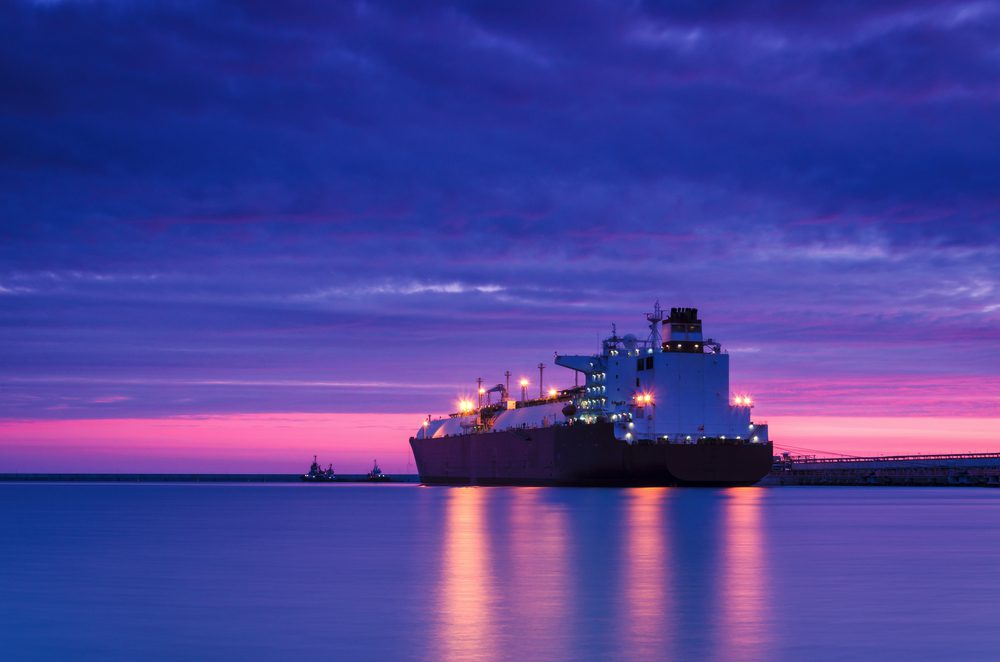Photo: Wojciech Wrzesien / Shutterstock
By Salvatore R. Mercogliano, Ph.D. – Maritime news hubs and trade associations are abuzz with rumors that the Trump Administration is considering a waiver of the nearly 100-year-old Merchant Marine Act of 1920, commonly referred to as the Jones Act, for the Commonwealth of Puerto Rico. A ten-day waiver was passed in the fall of 2017 during relief operations following Hurricane Maria. A total of ten ships used to deliver relief supplies, evacuate people stranded on the island, and transport fuel to the island from the United States.
The Jones Act requires that such transportation between American ports be carried out by ships built, crewed, owned, and flagged in the United States. The past waiver, and the current one being considered, would allow for foreign built, crewed, owned, and flagged ships to transport LNG – liquified natural gas – from the lower 48 states, to Puerto Rico. The waiver is conditional on this specific cargo and that if a Jones Act compliant ship becomes available, the temporary condition would end.
On April 30, 2019, the CATO Institute held a forum on this issue. CATO has been leading an effort to repeal the Merchant Marine Act of 1920, blaming the decline on the American merchant marine specifically on the Jones Act. The conference examined the matter but failed to examine any alternatives beyond a waiver or complete repeal of the act. Before considering any response, several factors should be considered.
First, the Jones Act is not the reason that the United States merchant marine has declined from number one in the world, after World War Two, to 22nd today. It is a variety of factors, such as the rise of flags of conveniences – today the nations with the largest merchant fleets are Panama, Liberia and the Marshall Islands. Second, the development of the interstate highway system and pipelines in the United States eliminated the cargo that was needed to sustain a coastal merchant marine. Third, the end of differential payments in the late 1980s from the Merchant Marine Act of 1936 made it extremely cost prohibitive to build and operate ships under the American flag. This along with the shift in domestic construction toward Navy contracts under the 600-ship Navy meant that shipyards geared themselves to build naval versus commercial vessels.
The deep draft merchant marine numbers 180 ships according to the Maritime Administration (as of March 15, 2019); 99 are Jones Act eligible. These ships provide the basis for the United States to conduct, albeit, a small portion of its commerce in American hulls, but in time of war would be essential. Not only the ships, but the crews of these vessels are needed to activate the reserve sealift ships held by the Navy’ Military Sealift Command and the Ready Reserve Force. A blanket repeal would irrevocably damage the nation’s ability to respond to any military or national emergency as recently highlighted in the Center for Strategic and Budgetary Assessments report Sustaining the Fight: Resilient Maritime Logistics for a New Era.
How then does Puerto Rico get the American LNG it desires, without suitable Jones Act compliant vessels, and avoid having to import foreign LNG? There are several options to consider.
One would be to maintain the status quo, but this appears to be unlikely with the current level of interest in the topic. Two, grant the limited waiver and foreign ships could sail to the American Gulf coast and load LNG for shipment to Puerto Rico. Or three, allow an American operating company, to reflag LNG tankers to the US, replace the crews with Americans (like what happened in 1987 with the Kuwaiti tankers during the Tanker War) and utilize the waiver to circumvent the American-build restriction. To offset the higher operating prices incurred by American ships versus flags of conveniences, the government can provide a differential much like the one assigned to the sixty ships under the Maritime Security Program, to alleviate the costs of transportation.
This last option addresses several key issues. It removes the use and dependence on foreign tankers. It provides jobs and opportunities in the United States energy industry to export LNG. It increases the number of billets for merchant mariners while also reintroducing a technology to the American merchant marine, and potentially opening a new market. American shipbuilders could look to build a replacement for the reflagged ships. The administration and Congress could provide legislation for low-interest, long-term loans to offset the costs while at the same time providing an incentive for the national security utility of having such ships.
Currently, those in favor of the Jones Act and those in opposition are talking past each other, when they should be discussing what is best for all concerned. This last option provides not the ideal answer, but it is a compromise.

 Join The Club
Join The Club











